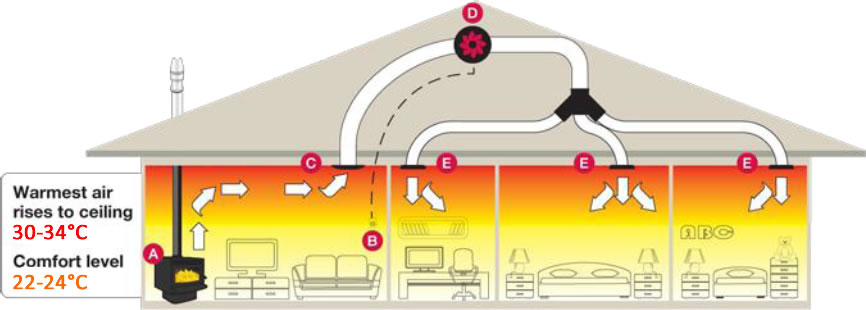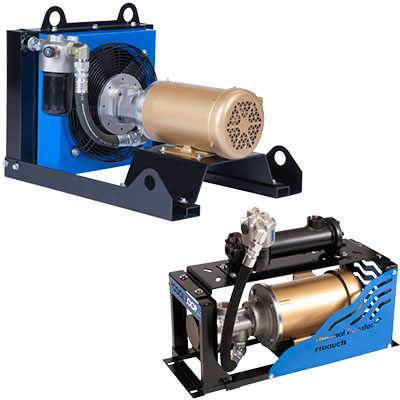Using Machine Learning in DVS Heat Transfer Systems for Smarter Heat Regulation
The Duty of Heat Transfer Solutions in Sustainable Power Solutions for the Future
Heat transfer systems are crucial in the mission for lasting power remedies. They enhance thermal power monitoring, enhancing the efficiency of eco-friendly modern technologies. By utilizing mechanisms like convection, radiation, and transmission, these systems minimize power losses. Their role in solar thermal and geothermal applications is especially considerable. As technologies arise, the possibility for further improvements raises vital concerns about future energy methods. What advancements will shape the landscape of sustainable power?
Understanding Heat Transfer Equipments

The Significance of Thermal Energy Management
Reliable thermal energy management is essential for making the most of energy efficiency and decreasing waste in numerous systems. By regulating temperature level and optimizing Heat transfer procedures, organizations can significantly minimize energy intake and operational costs. Efficient management entails the implementation of innovative modern technologies and methods that keep track of and manage thermal conditions within systems, guaranteeing that power sources are utilized successfully. On top of that, proper thermal power management adds to minimizing greenhouse gas discharges, aligning with global sustainability objectives. It likewise enhances system integrity and performance, bring about enhanced product high quality and longer tools life-span. Inevitably, prioritizing thermal power administration is an important step in the direction of developing extra lasting energy solutions and promoting a responsible technique to energy consumption in commercial and household contexts.
Applications of Heat Transfer in Renewable Resource
While numerous eco-friendly energy resources assure sustainability, the efficient application of Heat transfer plays an important duty in their efficiency. In wind power systems, Heat transfer is utilized for generator component cooling, boosting performance and durability. Geothermal energy depends on reliable Heat exchange in between the earth's subsurface and the fluid circulating in the system, maximizing energy extraction. Biomass power processes additionally gain from Heat transfer, as it assists in transforming organic products into functional gas via pyrolysis and gasification. Furthermore, in hydropower, preserving ideal temperatures in storage tanks can improve power output. Each of these applications demonstrates the crucial value of Heat transfer systems in improving renewable energy innovations, inevitably adding to a more lasting power future.
Enhancing Solar Thermal Power Performance
As solar thermal power systems remain to evolve, enhancing their efficiency has actually become vital for maximizing power output. Developments in Heat transfer innovations, such as boosted thermal storage products and innovative Heat exchangers, play a substantial duty in boosting performance. By using innovative materials that have remarkable thermal conductivity, systems can move and catch Heat much more successfully. In addition, integrating radar that adhere to the sunlight's course assurances that enthusiasts receive ideal solar exposure throughout the day. Making use of nanotechnology in solar absorbers can further raise energy absorption rates. Furthermore, including automatic control systems assists manage and manage temperature levels power circulation effectively, leading to decreased losses and improved general system efficiency. These enhancements lead the way for even more sustainable solar thermal power solutions in the future.
Geothermal Home Heating: A Sustainable Option
Geothermal home heating offers a feasible alternative for sustainable power, providing substantial ecological benefits through reduced greenhouse gas emissions. Its efficiency and cost-effectiveness make it an eye-catching alternative to conventional heater. Obstacles connected to implementation should be addressed to maximize its possible influence.
Ecological Advantages of Geothermal
Standard home heating approaches contribute considerably to greenhouse gas discharges, geothermal heating offers an engaging option that decreases environmental effect. By utilizing the Planet's internal Heat, geothermal systems use an eco-friendly energy resource, significantly lowering dependence on nonrenewable fuel sources. This approach produces minimal carbon exhausts, making it a cleaner alternative for domestic and industrial heating. Furthermore, geothermal systems advertise energy performance, as they call for much less power contrasted to conventional heater. DVS Heat Transfer Systems. The application of geothermal energy likewise assists in reducing air contamination, improving neighborhood air high quality and public health. As a sustainable option, geothermal home heating supports environment change mitigation efforts, placing itself as a necessary element in the change in the direction of a greener future
Performance and Cost-Effectiveness
How does geothermal heating determine up in terms of performance and cost-effectiveness contrasted to standard heating systems? go to this website Geothermal heating demonstrates superior performance, commonly accomplishing a coefficient of performance (POLICE) of 3 to 5, indicating it produces three to 5 units of Heat for every device of electricity consumed. This efficiency translates right into lower operating expenses, specifically in regions with steady geothermal sources. First setup prices can be more than conventional systems; nevertheless, long-lasting financial savings on power costs and decreased maintenance expenditures can balance out these in advance financial investments. Additionally, lots of federal governments incentivize geothermal systems via refunds and tax obligation credit histories, improving their cost-effectiveness. On the whole, geothermal home heating arises as a economically viable and sustainable choice to even more traditional home heating options.
Application Challenges and Solutions
Countless challenges can hamper the extensive execution of geothermal heating unit, regardless of their clear advantages as a sustainable energy remedy. High initial setup costs frequently deter home owners and investors, making financing a substantial obstacle. Additionally, the geographical limitations of appropriate geothermal sites restrict access in specific regions. Regional regulations and permitting procedures can likewise complicate job advancement, resulting in hold-ups. Public understanding and understanding of geothermal systems continue to be reduced, impeding acceptance. To resolve these challenges, targeted education campaigns can enhance open secret, while federal government rewards can minimize monetary burdens. Collaborating with neighborhood authorities to simplify guidelines may assist in smoother project approvals, ultimately promoting the adoption of geothermal website here home heating as a feasible, sustainable energy option.
Advancements in Heat Transfer Technologies
Innovations in Heat transfer innovations play a crucial function in boosting power performance and sustainability. Advanced Heat exchangers and stage adjustment products are at the leading edge of these developments, supplying significant improvements in thermal administration. These modern technologies not only enhance power usage yet also add to minimizing ecological influence in different applications.
Advanced Heat Exchangers
Advanced Heat exchangers play an important role in enhancing energy effectiveness throughout numerous applications in sustainable energy services. These gadgets help with the transfer of Heat in between 2 or more fluids, markedly decreasing power consumption in procedures such as industrial heating, cooling, and power generation. Innovations in products and layout, such as the use of nanofluids and small setups, have caused enhanced thermal efficiency and decreased size demands. Furthermore, improvements in electronic surveillance and control systems permit for maximized operation, additional enhancing performance. By lessening waste Heat and maximizing energy recuperation, advanced Heat exchangers add to lower carbon impacts and support the shift towards eco-friendly innovations. Their proceeded advancement is important for achieving global energy sustainability objectives.
Phase Adjustment Products
The assimilation of phase adjustment products (PCMs) into Heat transfer modern technologies stands for a considerable innovation in energy management and efficiency. PCMs soak up and launch thermal energy throughout their stage adjustments, enabling efficient temperature browse around these guys law in building products and energy systems. By storing excess Heat during height periods and releasing it when demand increases, PCMs add to load changing and energy conservation - DVS Heat Transfer Systems. This capacity enhances the efficiency of renewable resource systems, especially in solar thermal applications. Furthermore, PCMs can boost the thermal convenience of interior settings, lowering dependence on conventional heating and cooling down approaches. As advancements in PCM solutions remain to arise, their role in sustainable power options is positioned to grow, offering promising opportunities for future research study and application

Future Potential Customers for Heat Transfer in Lasting Power
As the need for sustainable power remedies proceeds to increase, the duty of Heat transfer systems is coming to be increasingly crucial fit future modern technologies. Developments in styles and materials are anticipated to enhance effectiveness in Heat transfer, lowering energy losses in different applications. The integration of sophisticated thermal storage space systems, such as stage adjustment materials and thermochemical storage space, will allow far better administration of power sources. Study right into nanofluids and biomimetic Heat exchangers may additionally enhance thermal efficiency. Furthermore, the fostering of clever modern technologies will certainly enable real-time monitoring and flexible control of Heat transfer procedures. These improvements are positioned to substantially contribute to the general efficiency and sustainability of energy systems, leading the way for an extra energy-efficient future.
Regularly Asked Questions
Just How Can People Apply Heat Transfer Systems in your home?

Individuals can execute Heat transfer systems in your home by installing energy-efficient home appliances, making use of radiant home heating, and optimizing insulation. These measures enhance power efficiency, decrease prices, and promote lasting methods in household settings.

What Are the Expenses Linked With Setting Up Heat Transfer Solutions?
The prices related to installing Heat transfer systems vary extensively, typically including devices, setup labor, and maintenance. Factors such as system kind, home size, and local laws substantially affect the general expense included.
Are There Government Rewards for Heat Transfer System Installations?
Government incentives for Heat transfer system installments differ by area and can consist of tax discounts, debts, and gives. These financial benefits intend to motivate adoption, eventually advertising power efficiency and minimizing environmental effect within communities.
Exactly How Do Heat Transfer Equipments Effect Power Costs?
Heat transfer systems notably affect power costs by optimizing power efficiency. By boosting the transfer of Heat, these systems lower energy consumption, bring about lower energy prices and producing a more lasting method to power management.
What Upkeep Is Needed for Heat Transfer Solutions?
Upkeep for Heat transfer systems includes routine assessments, cleansing of components, inspecting liquid degrees, guaranteeing correct insulation, and replacing used parts. These tasks aid maintain performance, prevent breakdowns, and lengthen the system's functional lifespan.
These systems assist in the motion of thermal power from one medium to one more, making it possible for the transfer of Heat for heating, power, or cooling generation purposes. Geothermal energy counts on efficient Heat exchange in between the earth's subsurface and the fluid distributing in the system, making best use of energy removal. In addition, geothermal systems promote power effectiveness, as they call for much less energy contrasted to traditional home heating systems. Advanced Heat exchangers play an essential role in boosting energy performance throughout numerous applications in sustainable power options. Heat transfer systems notably affect power bills by enhancing power effectiveness.